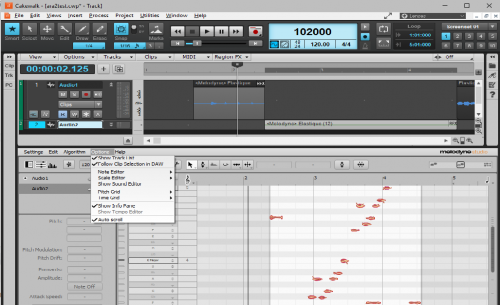-
Posts
5,852 -
Joined
-
Last visited
-
Days Won
107
Everything posted by Noel Borthwick
-
Are you using a custom theme?
-
Not a problem to use these in your songs. What would be the point of providing them otherwise
-
Hi folks, with the ara2 integration if you are running Melodyne editor or higher a single Melodyne view is used to display the blobs for all clips in the project. You can think of Melodyne as the editor for all blobs in the project so no need to close and reopen for each clip. In Melodyne Studio there is a setting (I thought it was in by default but could be mistaken) to follow clip selection in the daw. Make sure that is enabled and when you click on a clip the view should automatically scroll to highlight the selected clip. See the screenshot. If you switch tracks it should also follow the track selection. You can also double click a clip on a different track and Melodyne should automatically activate that track and follow the selection. If you don't want to use a single view you can still open multiple views by pinning the open view and opening a fresh view on a different clip. To automatically pin a melodyne view and open a second view simply double click on the new melodyne clip you want to open while holding down the CTRL key. We don't show the pin icon on ARA views but you can still pin views this way and open multiple instances of Melodyne views if you prefer working that way. Note however that each view instance will still show multiple ARA clips unless you turn off follow clip selection in DAW from the Melodyne options. That said if you still feel you are having issues please forward a project file with a description and I will look into it. Celemony is about to release a new update to version 4 which also fixes several Melodyne bugs that may be relevant to what you are seeing. Edit: I incorrectly said SHIFT when I meant CTRL key. Also added clarification that the screenshot above is for Melodyne Studio. The clips follow tempo choice isn't available for lower versions.
-
Try turning on the option for clips following selection. I posted a screenshot here.
-
I use a synology NAS and it has already bailed me out twice. Since you set it up with redundancy if one drive dies you can simply replace that one drive and get back all your data. Of course the entire NAS can die in a disaster so you need to have cloud storage or redundant NAS backup as well. I use crashplan for cloud storage as well. However since my projects live both on the NAS and the HD there is a low chance of needing the cloud. A NAS is well worth the investment. You can get one with the hard drives for around $600 depending on how much storage you want of course.
-
@Daniil Potseluev I heard from Celemony that this bug is fixed for their upcoming release.
-

I think the new Cakewalk is cold, always freezing
Noel Borthwick replied to Øyvind Skald's topic in Cakewalk by BandLab
Both crashes are in the EchoDelay plugin while loading your project. These dump files have nothing to do with track freeze operations. Did you send the correct files? Unhandled exception at 0x00000001427E8941 (EchoDelay.dll) in _05202019_144105.dmp: 0xC0000005: Access violation reading location 0x000000000D79FDB0. One thing to try if the above crashes continue is to turn off "Show project load notifications" in Options | Display and see if it improves. -

Drag and Drop with EZDrummer2 not working
Noel Borthwick replied to Jeff Dolan's topic in Cakewalk by BandLab
Are you running CbB as an admin? There are cases when Windows blocks drag and drop of files (for some misinformed security reasons) -
Yeah I see that however CbB has arbitrary clip automation envelopes, not a static gainstage like there. My point is its somewhat harder to apply to the waveform. If it was a simple gainstage we'd have done it a long time ago.
-
Its not the same thing. That's clip fades which already visually affect audio in CbB. Drag the fade handles on the left or right edge of the clip and it will affect the waveform. I think the request is for visual clip gain envelopes which is different from the picture.
-

[Solved] CbB going into la la land with the click of a mouse.
Noel Borthwick replied to bitman's topic in Cakewalk by BandLab
Yes please send a dump. -

CbB 2019.05 and Melodyne 4.2.1.003 BUG
Noel Borthwick replied to Ciodontrax's topic in Cakewalk by BandLab
I don't see any issue following your steps with Melodyne Studio. Which version are you running? In any case this would be a Melodyne report and not CbB related so you should contact Celemony directly. >>4. In melodyne window menu go to edit / cancel I assume that you meant edit Undo here since there is no cancel menu item. -

Multiple Vst Inputs Scrambled Track Templates
Noel Borthwick replied to Jaime Ramírez's topic in Cakewalk by BandLab
Its already logged in our database so we'll look into it at some point. -

Cakewalk Doesn't Release When Closed
Noel Borthwick replied to Moving Air Productions's topic in Cakewalk by BandLab
@Moving Air Productions please repro the hang and send me the dump file. That should show what is preventing the app from closing. Also if possible send me just the project file (.cwp). There are instructions here on how to capture the dump file from the hung application. -
Do you have a lot of tracks with automation write enable set in the project? Also if you go back to a prev version of the project does the issue come back?
-

I think the new Cakewalk is cold, always freezing
Noel Borthwick replied to Øyvind Skald's topic in Cakewalk by BandLab
The files were all zero length. Please upload them again -

Cakewalk Doesn't Release When Closed
Noel Borthwick replied to Moving Air Productions's topic in Cakewalk by BandLab
If Cakewalk closes (not in task manager) all file handles will be released. While the app is open its possible that a file could be still open if its still referenced in the clipboard. i.e. if a clip was copied you can close the project and still paste it into a newly opened project. -

MIDI Sound on Sound Bounce to Clips
Noel Borthwick replied to Larry Jones's topic in Cakewalk by BandLab
Why not just select the track by clicking on the number - that should select all the clips on that track. Then choose bounce to clips to combine them all. -

Can I bounce a midi clip into wav?
Noel Borthwick replied to pdkmusic's topic in Cakewalk by BandLab
To export a MIDI clip through a synth the output needs to go to an audio track so bounce to clip isn't the appropriate command. That will bounce the MIDI as MIDI.Well you don't even need to export audio. Assuming its an instrument track just select the MIDI clip you want and choose bounce to track, pick source category as Tracks and bounce to a new track. This will give you the MIDI rendered through that instrument track. If its a split instrument with MIDI and synth tracks then select the clip you want followed by selecting both the synth track and the MIDI track. Then bounce to track as above. Both will give you what you want. We could add a render command to a MIDI clip but it would require specifying where you want the rendered audio to go. -

[Solved] CbB going into la la land with the click of a mouse.
Noel Borthwick replied to bitman's topic in Cakewalk by BandLab
Do you have a dump file for this? -

I think the new Cakewalk is cold, always freezing
Noel Borthwick replied to Øyvind Skald's topic in Cakewalk by BandLab
@ØSkald Your dump is referencing the 25.03.0.20 which is the March release. Can you please retest this with the latest May release? If it still crashes/hangs then send a new dump -
Thanks @Daniil PotseluevPotseluev I will pass on your feedback to Celemony about Melodyne essential. If it's not possible then we can consider making the new behavior optional. You have Melodyne version 4 correct?
-
This is expected behavior. Please see the release notes: All ARA 2 clips now share a common view. So navigating across multiple clips is as simple as clicking on a clip. The view data in Melodyne will automatically change to track the selected clip. Is is a lot faster than double clicking clips to close and reopen a new view. In ARA 2 plugins there is no need to open a specific instance of the editor for each clip since Melodyne knows how to display the current clip data via ARA 2. Make sure that "Follow Clip Selection" is enabled in Melodyne and as you click the viewed data will automatically change. See screenshot. Also make sure you are running the latest version of Melodyne 4.
-

I think the new Cakewalk is cold, always freezing
Noel Borthwick replied to Øyvind Skald's topic in Cakewalk by BandLab
Its not a known issue. Please follow these instructions to capture a dump file for the hang and send me the link so we can know what is hanging. -

2019.05 CbB Release highlights
Noel Borthwick replied to Noel Borthwick's topic in Cakewalk by BandLab
Glad you find it useful @RBH. We spent a lot of time finding and tracking each case where slip editing was inaccurate. There are a ton of permutations we had to consider when you throw combinations of editing edges, stretching, tempo maps and also throw ARA into the mix. We want editing to be as solid as possible since it's a primary function. Let us know if you find any problem cases we may have missed.




